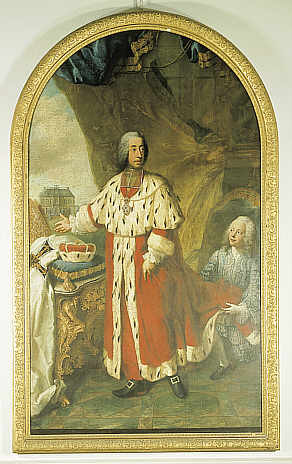
Clemens Augustus I of Bavaria (German: Clemens August I von Bayern) (1700 - 1761) was the Archbishop of Cologne from 1723 until 1761, the Bishop of Regensburg from 1716 until 1719, the Bishop of Münster from 1719 until 1761, the Bishop of Paderborn from 1719 until 1761, the Bishop of Hildesheim from 1724 until 1761, the Bishop of Osnabrück from 1728 until 1761, and the Grandmaster of the Teutonic Order from 1732 until 1761.
Clemens Augustus was the fourth son of Duke Maximilian II of Bavaria. Due to Maximilian II's alliance to France in the War of the Spanish Succession (1702 - 1714), Clemens Augustus was educated by the Jesuits in Austria under Imperial supervision away from his parents from 1706. He was only reunited with them in 1715. Maximilian II had a large interest in European power politics and he raised Clemens Augustus in the same, sending him into a life in the clergy so he could obtain several prince-Bishoprics in the empire, increasing the power of the Wittelsbachs.
In 1715 he was made the coadjutor of the Bishopric of Regensburg, being appointed the bishop of it the following year. From 1717 until 1719, he studied theology in Rome. In 1719 he was elected the Bishops of Münster and Paderborn, through by no small effort by his father, although he retired from the Bishopric of Regensburg. In 1722 he became the coadjutor of Cologne, and the following year after the death of his uncle Archbishop Joseph Clemens he was elected the Archbishop of Cologne. In 1724 he was elected the Bishop of Hildesheim, and in 1728 also the Bishop of Osnabrück.
Due to the personal union of so many powerful spiritual princedoms, Pope Benedict XIII had not yet confirmed him. In 1725 he received priests' consecration in Munich. in 1726 his father died. The following year he received bishops consecration, and was finally confirmed by Pope Benedict XIII. In 1732 he was also elected the Grandmaster of the Teutonic Order. With the number of prince-bishoprics he ruled, Clemens Augustus was strongly represented at the Reichstag. In 1742 he elected Duke Charles Albert of Bavaria the Holy Roman Emperor and crowned him in Frankfurt.
Clemens Augustus was also very wealthy. He was an avid art collector and builder, and employed thousands of labourers. In Bonn alone in 1754 he had more than 1400 labourers working on construction. He had many houses across Germany, and all were filled with extravagant and pompous furniture and art collections. In later life he suffered from wild mood swings, which were made considerable worse after the death of his friend Baron John Baptist of Roll. Clemens Augustus died on 2 February 1761.
|
Preceded by: |
Theodoric I of Hengebach |
Succeeded by: |
|---|---|---|
| Joseph Clemens of Bavaria | Archbishop of Cologne 1723 - 1761 |
Maximilian Frederick of Königsegg-Rothenfels |
| Joseph Clemens of Bavaria | Bishop of Regensburg 1716 - 1719 |
John Theodore of Bavaria |
| Francis Arnold Joseph Wolf von Metternich zu Gracht | Bishop of Münster 1719 - 1761 |
Maximilian Frederick of Königsegg-Rothenfels |
| Francis Arnold Joseph Wolf von Metternich zu Gracht | Bishop of Paderborn 1719 - 1761 |
William Anthony of the Asseburg |
| Joseph Clemens of Bavaria | Bishop of Hildesheim 1723 - 1761 |
Frederick William of Westphalia |
| Joseph Clemens of Bavaria | Bishop of Osnabrück 1728 - 1761 |
Frederick Augustus of Hannover |
| Francis Louis of Palatinate-Neuburg | Grandmaster of the Teutonic Order 1732 - 1761 |
Charles Alexander of Lorraine |
